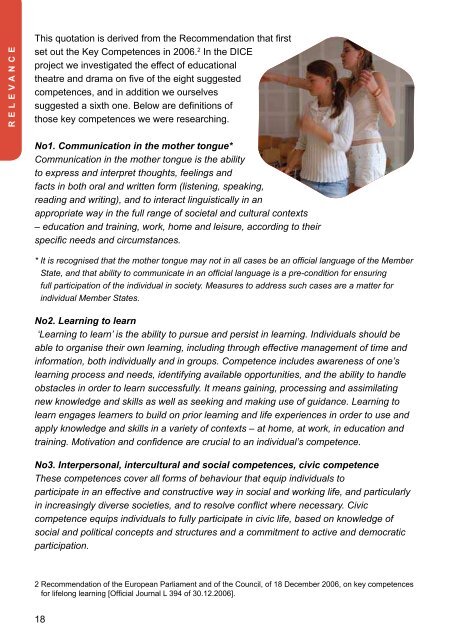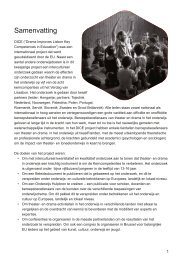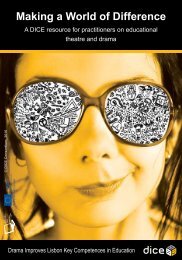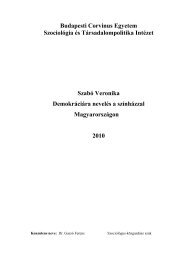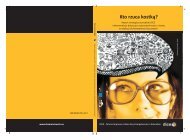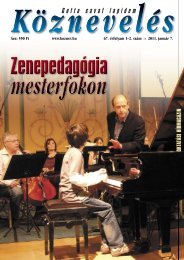Policy Paper - Drama Improves Lisbon Key Competences in Education
Policy Paper - Drama Improves Lisbon Key Competences in Education
Policy Paper - Drama Improves Lisbon Key Competences in Education
You also want an ePaper? Increase the reach of your titles
YUMPU automatically turns print PDFs into web optimized ePapers that Google loves.
Relevance<br />
This quotation is derived from the Recommendation that first<br />
set out the <strong>Key</strong> <strong>Competences</strong> <strong>in</strong> 2006. 2 In the DICE<br />
project we <strong>in</strong>vestigated the effect of educational<br />
theatre and drama on five of the eight suggested<br />
competences, and <strong>in</strong> addition we ourselves<br />
suggested a sixth one. Below are def<strong>in</strong>itions of<br />
those key competences we were research<strong>in</strong>g.<br />
No4. Entrepreneurship<br />
Entrepreneurship refers to an <strong>in</strong>dividual’s ability to turn ideas <strong>in</strong>to action. It <strong>in</strong>cludes<br />
creativity, <strong>in</strong>novation and risk tak<strong>in</strong>g, as well as the ability to plan and manage projects<br />
<strong>in</strong> order to achieve objectives. This supports everyone <strong>in</strong> day to day life at home and <strong>in</strong><br />
society, employees <strong>in</strong> be<strong>in</strong>g aware of the context of their work and be<strong>in</strong>g able to seize<br />
opportunities, and is a foundation for more specific skills and knowledge needed by<br />
entrepreneurs establish<strong>in</strong>g social or commercial activity.<br />
Relevance<br />
No1. Communication <strong>in</strong> the mother tongue*<br />
Communication <strong>in</strong> the mother tongue is the ability<br />
to express and <strong>in</strong>terpret thoughts, feel<strong>in</strong>gs and<br />
facts <strong>in</strong> both oral and written form (listen<strong>in</strong>g, speak<strong>in</strong>g,<br />
read<strong>in</strong>g and writ<strong>in</strong>g), and to <strong>in</strong>teract l<strong>in</strong>guistically <strong>in</strong> an<br />
appropriate way <strong>in</strong> the full range of societal and cultural contexts<br />
– education and tra<strong>in</strong><strong>in</strong>g, work, home and leisure, accord<strong>in</strong>g to their<br />
specific needs and circumstances.<br />
* It is recognised that the mother tongue may not <strong>in</strong> all cases be an official language of the Member<br />
State, and that ability to communicate <strong>in</strong> an official language is a pre-condition for ensur<strong>in</strong>g<br />
full participation of the <strong>in</strong>dividual <strong>in</strong> society. Measures to address such cases are a matter for<br />
<strong>in</strong>dividual Member States.<br />
No2. Learn<strong>in</strong>g to learn<br />
‘Learn<strong>in</strong>g to learn’ is the ability to pursue and persist <strong>in</strong> learn<strong>in</strong>g. Individuals should be<br />
able to organise their own learn<strong>in</strong>g, <strong>in</strong>clud<strong>in</strong>g through effective management of time and<br />
<strong>in</strong>formation, both <strong>in</strong>dividually and <strong>in</strong> groups. Competence <strong>in</strong>cludes awareness of one’s<br />
learn<strong>in</strong>g process and needs, identify<strong>in</strong>g available opportunities, and the ability to handle<br />
obstacles <strong>in</strong> order to learn successfully. It means ga<strong>in</strong><strong>in</strong>g, process<strong>in</strong>g and assimilat<strong>in</strong>g<br />
new knowledge and skills as well as seek<strong>in</strong>g and mak<strong>in</strong>g use of guidance. Learn<strong>in</strong>g to<br />
learn engages learners to build on prior learn<strong>in</strong>g and life experiences <strong>in</strong> order to use and<br />
apply knowledge and skills <strong>in</strong> a variety of contexts – at home, at work, <strong>in</strong> education and<br />
tra<strong>in</strong><strong>in</strong>g. Motivation and confidence are crucial to an <strong>in</strong>dividual’s competence.<br />
No3. Interpersonal, <strong>in</strong>tercultural and social competences, civic competence<br />
These competences cover all forms of behaviour that equip <strong>in</strong>dividuals to<br />
participate <strong>in</strong> an effective and constructive way <strong>in</strong> social and work<strong>in</strong>g life, and particularly<br />
<strong>in</strong> <strong>in</strong>creas<strong>in</strong>gly diverse societies, and to resolve conflict where necessary. Civic<br />
competence equips <strong>in</strong>dividuals to fully participate <strong>in</strong> civic life, based on knowledge of<br />
social and political concepts and structures and a commitment to active and democratic<br />
participation.<br />
2 Recommendation of the European Parliament and of the Council, of 18 December 2006, on key competences<br />
for lifelong learn<strong>in</strong>g [Official Journal L 394 of 30.12.2006].<br />
No5. Cultural expression<br />
Appreciation of the importance of the creative expression of ideas, experiences and<br />
emotions <strong>in</strong> a range of media, <strong>in</strong>clud<strong>in</strong>g music, perform<strong>in</strong>g arts, literature, and the visual<br />
arts. Self-expression through the variety of media […]. Skills <strong>in</strong>clude also the ability to<br />
relate one’s own creative and expressive po<strong>in</strong>ts of view to the op<strong>in</strong>ions of others. [...]<br />
A strong sense of identity is the basis for respect and [an] open attitude to diversity of<br />
cultural expression.<br />
The partners <strong>in</strong> the project have also added a sixth competence to reflect our practice<br />
and to accompany the other five:<br />
No6. All this and more...<br />
The No6 on our DICE <strong>in</strong>corporates the first five but adds a new dimension because<br />
educational theatre and drama is fundamentally concerned with the universal<br />
competence of what it is to be human. An <strong>in</strong>creas<strong>in</strong>g concern about the coherence of<br />
our society and develop<strong>in</strong>g democratic citizenship requires a moral compass by which to<br />
locate ourselves and each other <strong>in</strong> the world and to beg<strong>in</strong> to re-evaluate and create new<br />
values; to imag<strong>in</strong>e, envisage, a society worth liv<strong>in</strong>g <strong>in</strong>, and liv<strong>in</strong>g with a better sense of<br />
where we are go<strong>in</strong>g with deep convictions about what k<strong>in</strong>d of people we want to be.<br />
A.4. The relevance of the DICE project for<br />
research <strong>in</strong> education and educational theatre<br />
and drama<br />
Although the <strong>Lisbon</strong> Strategy has identified eight key competences as recommended<br />
objectives of education <strong>in</strong> Europe, the widely used and known large-scale student<br />
assessment programmes such as PISA (Programme for International Student<br />
Assessment), TIMSS (Trends <strong>in</strong> International Mathematics and Science Study) or PIRLS<br />
(Programme for International Student Assessment) target two of them almost exclusively:<br />
Communication <strong>in</strong> the mother tongue and Mathematical competence and basic<br />
competences <strong>in</strong> science and technology. Large-scale <strong>in</strong>ternational student assessments<br />
are unfortunately limited not just <strong>in</strong> their focus but <strong>in</strong> their methodological approach as<br />
18<br />
19


